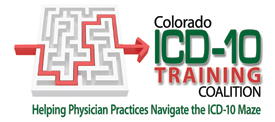ICD-10 update
Denny Flint, Director of Business Development, Assistive Coding, LLC

ICD-10 is just the vessel. The real cargo? Data!
Stop focusing on ICD-10! The real elephant in the room is the rapid proliferation of diagnosis-based reimbursement. The role of ICD-10 (if and when it actually comes to pass) needs to be re-evaluated. ICD-10 will merely be the language by which your public face (coding profile) is expressed to the outside world. ICD-10 is a vehicle for capturing more specific, detailed data, nothing more and nothing less.
The nation is rendering itself asunder with an ICD-10 argument that completely misses the point. Forget ICD-10 for a moment and take a look around. Think about all the new acronyms – ACO, HCC, RAF, PCMH and how they relate to chronic disease burden management. The old paradigm that says “the more you treat, the more you make” is changing. Insurance companies are aggressively pushing shared risk programs that stress quality of care at less cost. The only way to do that is to move away from the unsustainable model we have now. The paradigm shift to the new mantra “the less you treat, the more you make” needs to be embraced while upholding the sacred commitment to high quality of care.
We saw the shift start to occur with capitation in the ‘80s. The “per head” model frankly failed because we didn’t have the data to truly assess how sick our assigned patient population really was in order to analyze whether or not the amount of capitation was sufficient to carry the treatment burden for that population. Not having adequate data is also the reason many ACOs fail.
With an anticipated 30 percent of the patient population moving to shared risk models within the next year, isn’t it time we took the new paradigm of “less is more” seriously? Patient Centered Medical Home with its tiered $1, $2, $3 per head compensation is yet another attempt to open the door to providers taking on more and more risk. We’ll get used to a capitation model in the same way PQRS started to get us comfortable with “value based” reimbursement.
As we go through the next phase of physician compensation shift, the value based model tells us that physicians will not get paid based on what they do, but rather for how well they can prove they do it. Is consumerism the next iteration? Perhaps. In the final drive to diagnosis-based reimbursement, physicians will not be paid based on what they do (CPT), but rather based upon what’s wrong with the patient (ICD-9 or 10). For the naysayers and for those of you old enough to remember, I merely remind everyone about what the prevailing hospital-view was when Yale released the original DRG system in the ‘70s. “Oh, it’ll never happen.”
It happened to hospitals and it’s happening once again to physicians. You see, insurance companies want to take the decision for care out of the provider’s hands. Their clarion calls were, “needless diagnostic tests, over-treatment, and unnecessary procedures.” When insurance companies shift to paying physicians according to what’s wrong with the patients, the ability to overwork the system is removed. Before everyone cries foul, please keep in mind our current system is unsustainable.
So how does a practice thrive in this drive to “less is more” ACOs and other related Dx-based reimbursement models? The key is data. Arm yourself with accurate acuity level data that indicates how sick your patients really are and what amount of care can be expected to be delivered. This is where an ACO decision-to-participate needs to begin. Without this data you are flying blind. Specificity, at least in as much as ICD- 9 currently affords, is key. When asked about the best way to begin an ICD-10 transition, I always say, “It starts with clinical documentation improvement that mandates physicians must provide the documentation elements to meet the specificity.” Specialty-specific physician documentation education, baseline chart reviews that reveal current documentation shortfall, and HCC analysis for your particular specialty are valuable tools.
By doing so, you will reap benefits not only for the future of ICD-10 success for your practice, but also for the current shift in the way physicians will be paid.
Denny Flint is a Senior Consultant and Director of Business Development for Assistive Coding, LLC, a member of The Pinnacle Group family of physician financial, education, strategic planning, and coding suite of services.
Denny can be reached at dflint@assistivecodingservices.com or at 970-390-8970.
Posted in: Colorado Medicine | Practice Management | Coding and Billing

Comments
Please sign in to view or post comments.